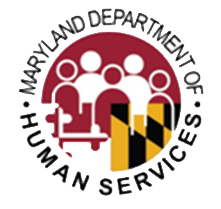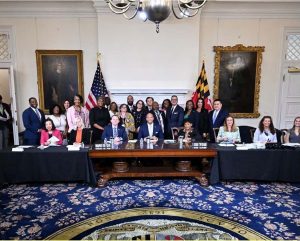
FOR IMMEDIATE RELEASE
May 9, 2024
Media Contact: Brian Schleter, Acting Director
brian.schleter@maryland.gov
Maryland Department of Human Services Celebrates the Signing of New Laws That Advance the Well-Being of Children, Adults, and Families
ANNAPOLIS, MD — Maryland Department of Human Services (DHS) Secretary Rafael López and department leaders joined Governor Wes Moore, Maryland Senate President Bill Ferguson and Speaker of the House Adrienne Jones at the State House to sign multiple bills passed in the 2024 legislative session that strengthen families and advance the overall well-being of Maryland children and adults.
Included among the department’s priority pieces of legislation signed today are:
SB0708 – Kinship Care – The new law takes effect October 1, 2024 and is the cornerstone of Maryland’s shift to a kin-first human services culture. The new law establishes a preference for youth experiencing out-of-home care to live with relatives, including family by choice. Research shows out-of-home kinship care provides familiarity, continuity, and additional safety that results in better outcomes for children and families. The law modernizes Maryland’s kinship care system by removing outdated language that excludes contemporary concepts of family and updating the law to reflect how families are formed today. Maryland’s kin-first approach prioritizes adult-child bonds that are critical to healthy development when considering the best interests of children who require out-of-home care. All kinship caregivers are assessed for suitability and vetted for safety.
“When a child must experience out-of-home care, they should be with kin who love them and provide the stability of a family, community, and culture. Research proves that kinship care minimizes trauma and increases children’s sense of belonging,” said Secretary Rafael López. “This new law is a major victory for Maryland children and families, and our Department is prepared to provide kinship families with the support they deserve.”
HB0183 – Summer EBT – By innovatively and seamlessly expanding Maryland’s successful state Summer SNAP program, DHS will partner with the Maryland State Department of Education to launch Maryland’s Summer Electronic Benefit Transfer Program for Children, known as SUN Bucks. SUN Bucks will feed 500,000 children across the entire state, in every one of Maryland’s 24 jurisdictions, when schools are closed for summer. Maryland families will have $120 in grocery buying benefits during the summer months for each child eligible for free and price-reduced school meals. An estimated 90% of students will be automatically enrolled. Federal funds will cover all of the cost of food benefits and half of the operating costs. Last year, Maryland’s original Summer SNAP program served 90,571 children in 14 jurisdictions.The program will generate approximately $60 million in new economic activity.
“Ending childhood poverty in Maryland will not happen overnight. The Moore-Miller administration is strategically leveraging finite state resources to access new federal funding so Maryland can better support families. SUN Bucks extends food security provided by school meals to summertime and strikes a blow against poverty with one of the single largest investments Maryland has seen to help feed our children,” said Secretary Rafael López.
HB 0435 – Incarcerated Obligors – This law fixes an unjustifiable barrier parents face meeting their child support obligations when they are detained in jail. Parents will now have flexibility to adjust their payments when they are detained but not found guilty of a crime or sentenced. It will take effect on October 1, 2024. The DHS Child Support Administration is actively planning for implementation and communication with stakeholders, including the Maryland Department of Public Safety and Correctional Services, Office of the Public Defender, detention centers, child support attorneys, and other interested parties.
“No child, no parent, and no family benefits when a parent accumulates a large amount of unpaid child support,” said Secretary Rafael López. “Our role is to ensure children receive the support they deserve to thrive. To do this, we should not make it harder for those who want to do right by their families. We should make it easier.”
SB0270 – Adult Public Guardianship Review Boards – The Adult Public Guardianship Review Boards in each jurisdiction ensure the well-being of vulnerable adults by evaluating the health and welfare of the individuals under guardianship. The multidisciplinary Boards make informed recommendations to the court regarding the continuation, modification, or termination of each guardianship. This new law streamlines membership requirements for the Adult Public Guardianship Review Board while maintaining necessary expertise. The law will reduce the number of vacant board positions statewide to more effectively protect the rights and welfare of the adults in guardianship.
“Adult Public Guardianship Review Boards provide essential protections for adults by ensuring their health and well-being needs are met while under guardianship protection. It is critical that the Boards maintain expertise, like which medications are appropriate, so they can make the most informed recommendations to the courts in each person’s individual situation.”
For additional information about all the programs DHS administers, visit our website at www.dhs.maryland.gov.

###